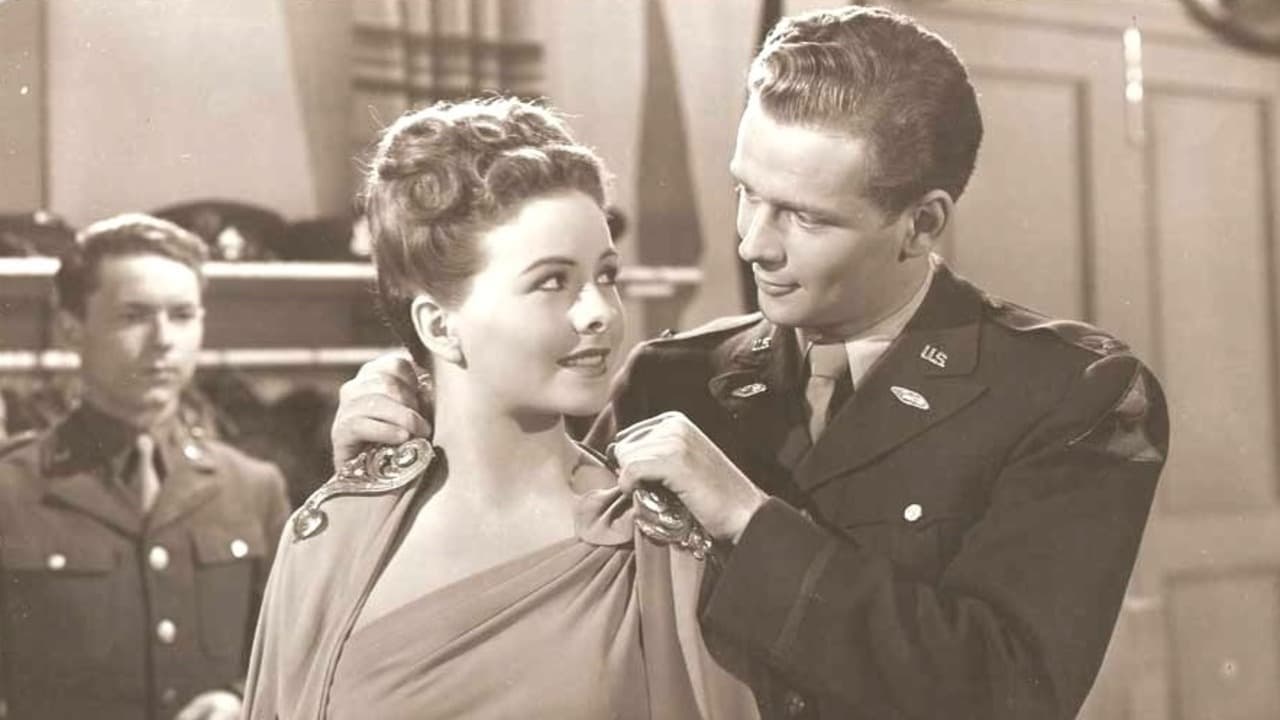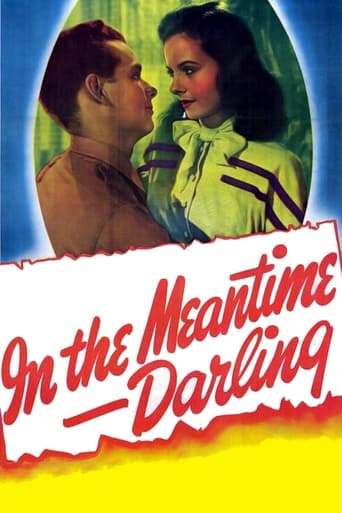

Producer: Otto Preminger. Copyright 13 September 1944 by 20th Century-Fox Film Corp. U.S. release: October 1944. U.K. release: 5 March 1945. Australian release: 29 March 1945. Sydney release at the Regent: 23 March 1945. Australian length: 6,670 feet (74 minutes). U.S. length: 6,368 feet (71 minutes).SYNOPSIS: Young wife moves into overcrowded boarding-house next to army training camp in order to be near her husband.COMMENT: Preminger's last "B" assignment. After this one, he took over the direction of Laura, and never looked back!Although "In the Meantime, Darling" is not a typical Preminger film in subject matter, it certainly is in style: particularly the long takes embodying fluid camera movement and the loving close-ups of the heroine (Jeanne Crain, here making her third film and one of her few "B"s) — a distinctive feature of Preminger's style until he was forced to drop it in the wide-screen era. Unfortunately, it is an approach that in Preminger's hands (at least in this film) — despite all the camera pyrotechnics (dollying, tracking, panning) and long takes — tends to be heavy and ponderous. In fact, this laborious approach smothers most of the comedy and plays up the jingoistic war-time propaganda sentiment.The script is extremely slight. It is constructed like a stage play rather than a film, with all the action confined to the one area (cleverly pinpointed by Preminger in the very opening shot of the film) and most of it to the one setting. Just about nothing happens except a few lovers' misunderstandings — and these are seen strictly from the heroine's point of view. The hero is such the typical sort of sook beloved of True Romances, it's hard to believe the script was written by two men. Not to put too fine a point on it, the film is out and out dime-store slush, through and through what the trade describes as "a woman's picture"."In the Meantime, Darling" was the first film Preminger produced (as well as directed), and he has surrounded himself with one of the largest casts ever assembled for a "B". Direction of acting was never one of Preminger's strong points, but the players here are reliable enough — even if most of them are so lost in the crowd they can barely be glimpsed for a few fleeting seconds. Although I've now seen "In the Meantime, Darling" no less than three times, I still haven't spotted Dorris Merrick at all, while Anne Corcoran makes her entrance in the film's last two minutes! Reed Hadley also has a minute role: he can be glimpsed hovering around the background of a couple of scenes and has all told exactly twelve words of dialogue — "You've got to be the man of the family while I'm gone." Even Mary Nash and Eugene Palette only come into the picture for a couple of scenes near the beginning (which is a pity since Palette is his usual delightfully acerbic self), while Blake Edwards (later to write/direct The Great Race, Darling Lili et al) can be spotted dancing in the ball scene — he has no dialogue at all.In point of fact, the whole screenplay centers on Miss Crain. The only other players to get much of a look-in are Frank Latimore, Stanley Prager and Gayle Robbins.Mr Latimore makes the hero even more unprepossessing than the script would seem to require, while Stanley Prager, the hero's obligatory buddy — a comic-relief fat boy — cuts an unlikely a figure as a lieutenant as he does as the husband of lovely Gayle Robbins. Miss Robbins has one song and though care has obviously been taken that she doesn't overshadow Miss Crain, she looks absolutely stunning. Miss Crain has the pick of the costumes and all the soft camera angles and lighting, but she is handicapped in some scenes with an inappropriate, upswept hair-style, which not even MacDonald's camera can wholly disguise. The only other player to get any attention is Jane Randolph, who plays the young, sympathetic landlady, married to a war hero (is that Louis-Jean Heydt in the photo on her dresser?). She acts with a poise that makes Miss Crain seem gawky and awkward in their scenes together. (On the whole, it must be admitted, considering her inexperience and lack of training, Jeanne gives a competent portrayal).In keeping with the enormous cast, production credits are also unusually high for a "B" (even by Fox's lavish standards). Aside from MacDonald's flattering photography, there's lilting music score by Cyril J. Mockridge, attractive costumes by Bonnie Cashin. Choreographer Geneva Sawyer was hired to oversee the ball scene (though the results are unimpressive, perhaps deliberately so).
... View MoreThis slight drama rather reminds me of the much more entertaining "Something for the Boys", also released by Fox in '44. That film clearly could be labeled a musical comedy, as there was plenty of both. In this film, there is a minimum of both. The chief bit of comedy comes from Jeanne Crane, as Maggie, making a total mess of her first attempt to prepare baby formula, highlighting her general lack of experience in home economics, despite having a college degree. She's used to servants doing these things. Then, there's the false rumor that she is pregnant, that she has to deal with. This was the film debut for Gale Robbins. Gale had been a singer in various bands. She would be sparingly used by Hollywood, seldom with a major part, as in this film. Sometimes, as in this film, she would get to sing a song. Given her beauty, singing and acting ability, it's a wonder she didn't become a major star. Instead,she was often cast as 'the other woman'. Information from another site indicates that there were many changes to the screenplay, even as filming proceeded, suggesting dissatisfaction. Veteran character actor Eugene Palette, who played Jeanne's father, was fired part way through, for pro-German utterances, and racial slurs. The film does give us some idea of the stressful conditions which many married military couples went through, forced to live in substandard temporary housing, until their next assignment.Available at YouTube
... View MoreThe purpose of this film was obvious--the filmmakers wanted to press home the notion that there must be self-sacrifice for the war effort. The problem is that this propaganda message seems a bit too obvious--especially since they made the main character, Maggie, a bit too unrealistic.When the film begins, Maggie (Jeanne Crain) is marrying Lt. Ferguson. However, it's obvious that they're a bit mismatched. He is a normal everyday guy, she's a spoiled rich brat who is used to having everyone cater to her. However, she's going to be living in a boarding house with a lot of other military wives...and it's going to be tough going because of her ridiculous expectations.The Maggie character was just poorly written. She either came off as an entitled jerk or a self-less woman who, miraculously, realizes the importance of the war. It's just too black & white in its portrayal of the lady. Overall, a decent enough idea for a wartime film but one that just doesn't seem to work.
... View MoreA society gal's disillusionment with her soldier husband's circumstances and a misunderstanding over a mistaken pregnancy are at the center of this story taking place during World War II. Over the course of the picture, newlywed Maggie Preston (Jeanne Crain) learns about her landlady's perseverance following the death of her husband and comes to realize that there's more to life and family than fancy gowns and high society.Though there are some humorous scenes, I wouldn't go so far as to call this a comedy, even if Lieutenant Daniel Ferguson (Frank Latimore) and Army buddy Red Pianatowski (Stanley Prager) mull over the concept of 'There's something funny going on around here'. I'm not sure if viewers of the era were able to accept Red's marriage to a knockout wife like Shirley (Gale Robbins). I certainly couldn't see it, especially with his gambling habit with the other boys in uniform. I guess that's another idea that was supposed to be funny but it just didn't translate for this viewer.I was wondering if they'd ever get around to the patriotic stuff, and in that regard landlady Jerry Armstrong (Jane Randolph) didn't let me down. She had an inspiring conversation with young Maggie to help her understand how her husband's service to the country is what made America a beacon to the free world.But you know, it's the little, otherwise unnoticed things in pictures like this that I really get a kick out of. Before we learn who Helen Corkery (Elisabeth Risdon) is, notice how she cautiously accepts Maggie Preston's 'tip' and surreptitiously places it in the Red Cross can. Later on at the celebration dance, one of the characters prefers to have a 'high ball'. Does anyone use that term anymore? And finally, I always like to give a plug to character actor Henry Muse whenever I catch him in a picture. As the hotel porter, he played it with dignity and charm, much unlike the way black actors were usually expected to perform in pictures of the era. His was probably the classiest performance here.
... View More